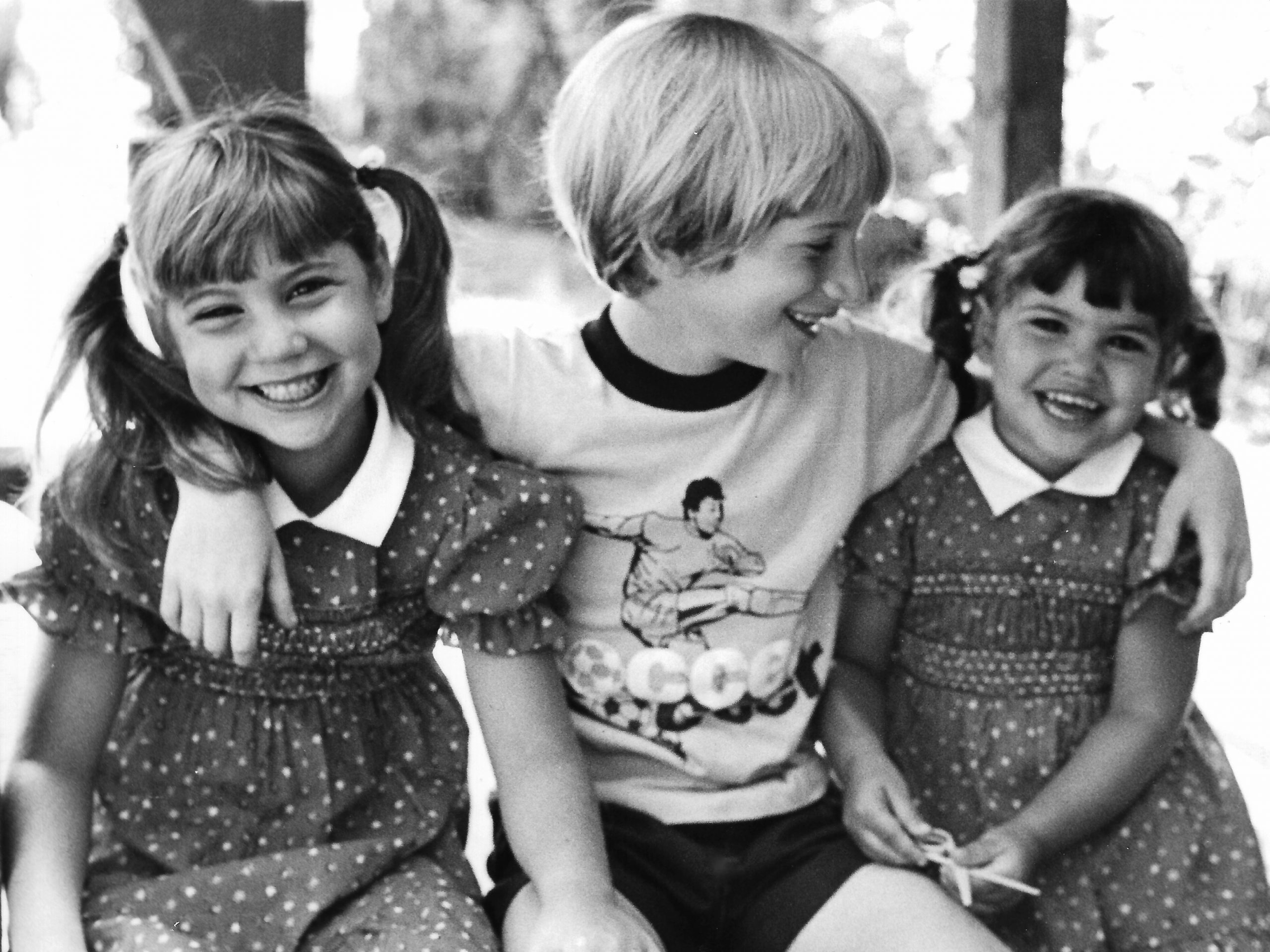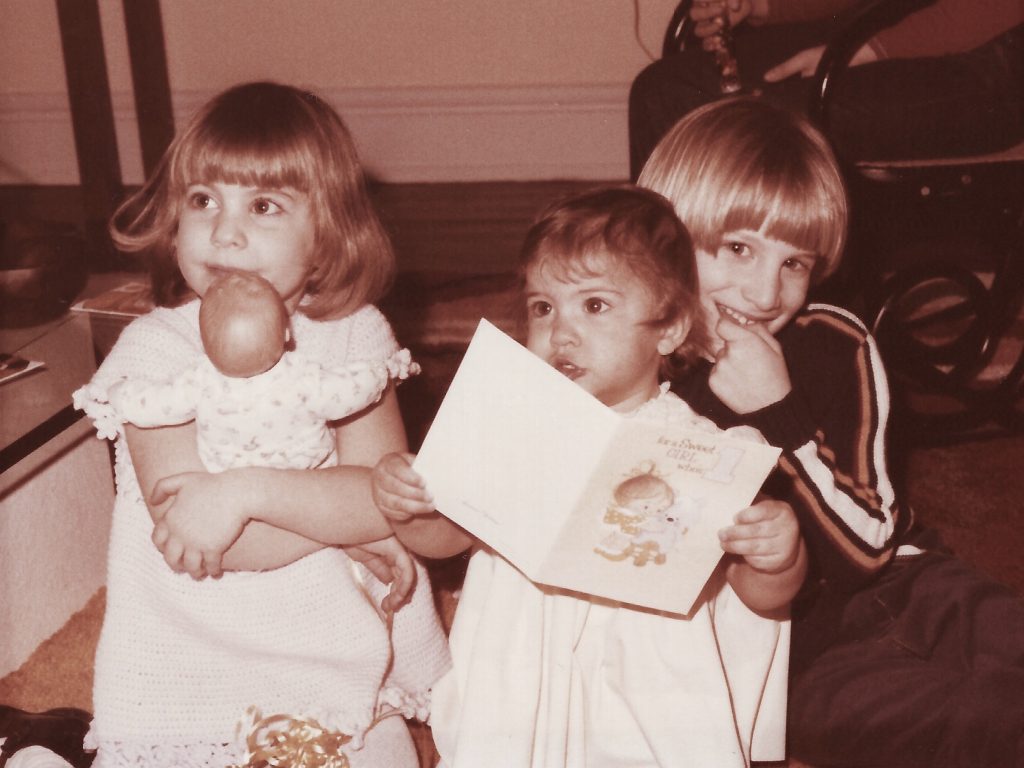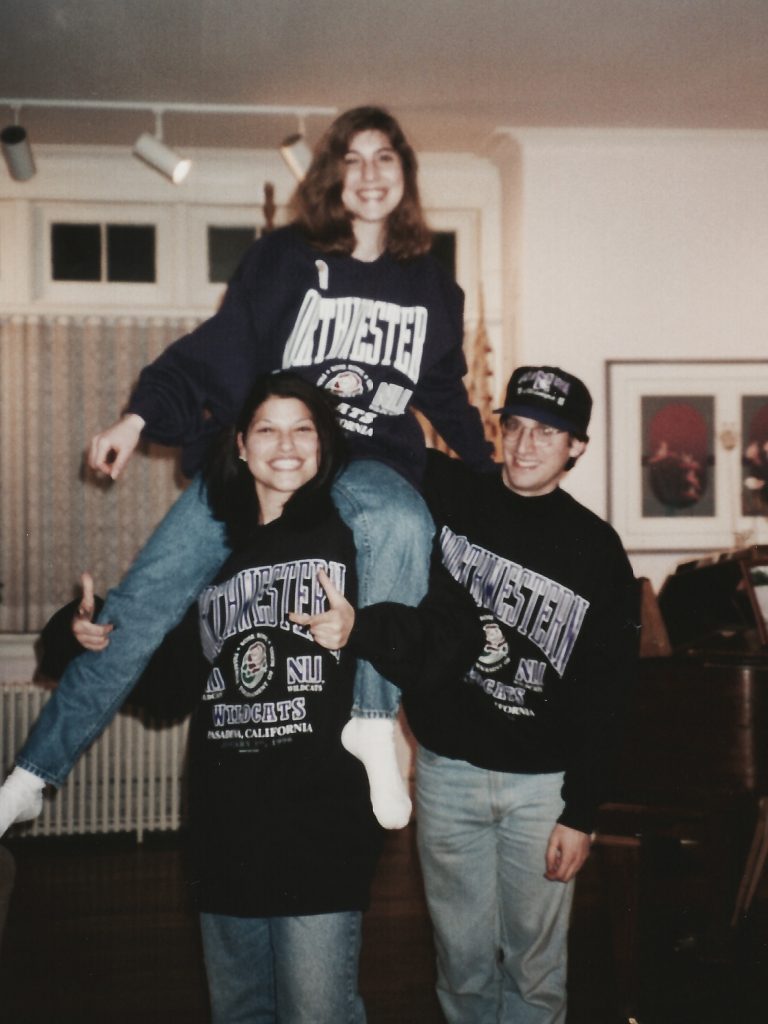
Middle child on the left. My apologies for the matching Polly Flinders dresses.
Today, August 12, is middle child day, a time to recognize those children sandwiched between the stereotype of the adored but pressured first child and the spoiled baby of the family. According to the myth I grew up with, middle children suffered from a syndrome in which they were neglected, lacked drive or ambition, and were envious, negative, and resentful. To overcome middle child syndrome, parents were advised to give their middle child extra attention. Just ask my middle brother, who probably would have preferred a bit of neglect growing up.
As we mark Middle Child Day, I think we are missing folks who embody the stereotypical qualities of middle children.
More modern research turns that stereotype on its head. According to Katrin Schumann, co-author of The Secret Power of Middle Children, in an article in Psychology Today, the middle child is the family peace-maker, sociable, cooperative, a team player, independent, and empathic. She is driven by principles and social causes rather than earning power or prestige. Being in the middle position among siblings teaches children to be good negotiators and compromisers, open to new ideas, and seekers of justice and fairness. That’s a pretty accurate description of my middle child.
Growing up, my middle child was particularly fond of a children’s book The One in the Middle is the Green Kangaroo by Judy Blume. I read this book with her so often that I still remember the plot about Freddy, who describes himself as the peanut butter squished between two slices of bread. Rejected by his older brother and blamed for making his baby sister cry, Freddy needs to find a way to stand out. When he plays the green kangaroo in a school play, he steals the show. My daughter loved that book and was my performing child as well.
The interesting thing about Middle Child Day is that there are far fewer middle children these days. The birth rate has been declining in the America. Right now, it is the lowest it has been in 30 years. Currently, it averages 1.71 children per woman, which is below the replacement rate, and there is no indication it will ever go back to its peak of 3.77 children per woman in 1957. This means babies born now will struggle to support an aging population. It also means there are far fewer middle children.
Those of us born in the baby boom years remember families of three or more children being the norm. I came from a family of three and my husband a family of four. Even though the rate had dipped to 2.48 kids by 1970, I wanted three, or even four, kids. After we had our third child in 1977, my husband suggested getting a dog next time I had the urge to nurture something small.
Today, families with one or two children are the norm. There are plenty of couples who have decided against having any kids. So middle children are less common these days. If you believe birth order contributes in part to a person’s character, this development is too bad. I can attest from my experience as first born that my middle sibling is the most sociable of the three of us. My own middle child has great empathy and is inclined to be a peace-maker and compromiser. Perhaps having fewer Americans who grew up having to negotiate domineering older sibs and irresponsible baby sibs accounts for some of our country’s inability to compromise? That’s probably a silly theory, but there must be something in the water these days as we can’t seem to find middle ground.
I’m by no means advocating larger families. The way things are going with our environment, climate, and resources, it’s probably better to be below the replacement rate. Yet, having fewer middle children is a significant change. As we mark Middle Child Day, I think we are missing folks who embody the stereotypical qualities of middle children.
I invite you to read my book Terribly Strange and Wonderfully Real and join my Facebook community.
Boomer. Educator. Advocate. Eclectic topics: grandkids, special needs, values, aging, loss, & whatever. Author: Terribly Strange and Wonderfully Real.





Thanks for pointing out the need for empathy and compromise, whether it comes from the inherent traits of middle children, or just because we, as society, need these traits so desperately now, Laurie. Well said.
Betsy, as I told Marian, I hope parents are trying to raise their children, regardless of birth order, to be empathic and able to compromise. Then, we should elect those children to Congress.
This is a fascinating take on the middle child, Laurie. My family and relatives weren’t the norm in the Baby Boom times, being limited to two children, and I don’t feel very qualified to make detailed observations about today’s scenario, given that I am childless by choice. I wonder, though, if there is a way to adjust our child rearing practices to smaller families to cultivate those much needed values you describe so well.
I’m not sure, Marian. I think they acquire these qualities through their interactions with their siblings. I sure hope people are trying to raise more empathic children who are capable of collaborating with others.
Laurie, this is a great analysis of the beneficial traits of middle children. As soon as I read it, I sent it to my middle sister and my son, and wished them a happy Middle Child Day. Also, I love the Polly Flinders dresses, no need to apologize for them!
Thanks, Suzy. I don’t know if there is a day for first or last borns, but my middle child would contend they don’t need any further attention. It was the fact that the dresses matched that irritated my daughters. Don’t know why I thought that was cute.
Ah, no middle children here – I’m one of two, and my husband and my son are both onlies.
But both my parents were middle children, and altho they had very different personalities – my mom bossy, talkative, and social, and my dad laid back, taciturn and a bit of a loner – they had a very happy marriage!
I have always wondered about whether people having the same birth order impacts a marriage. My youngest daughter is married to a man who is also the youngest of three. They laugh a lot are tend to do less worrying than my other kids. So there’s that.
Yep, who knows!
Thanks for such a thoughtful and insightful story, Laurie! To be honest, I never gave much thought to the loss of the middle child as the birth rate declines as I only thought of the positive effects on the planet. It’s unsettling to think about those positive qualities diminishing over time, but I do believe most people are kind and empathetic by nature regardless of their birth order…or at least half of us (if you catch my drift).
Barb, I totally catch your drift but also can tell you are a glass-half-full person. I’m not seeing too much empathy these days. Yesterday, a maskless young woman almost made me fall down the stairs at the hospital parking structure as I swerved to avoid her. She asked if I was OK, she there’s that.